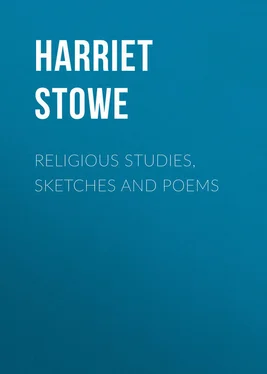Harriet Stowe - Religious Studies, Sketches and Poems
Здесь есть возможность читать онлайн «Harriet Stowe - Religious Studies, Sketches and Poems» — ознакомительный отрывок электронной книги совершенно бесплатно, а после прочтения отрывка купить полную версию. В некоторых случаях можно слушать аудио, скачать через торрент в формате fb2 и присутствует краткое содержание. Жанр: foreign_prose, на английском языке. Описание произведения, (предисловие) а так же отзывы посетителей доступны на портале библиотеки ЛибКат.
- Название:Religious Studies, Sketches and Poems
- Автор:
- Жанр:
- Год:неизвестен
- ISBN:нет данных
- Рейтинг книги:5 / 5. Голосов: 1
-
Избранное:Добавить в избранное
- Отзывы:
-
Ваша оценка:
- 100
- 1
- 2
- 3
- 4
- 5
Religious Studies, Sketches and Poems: краткое содержание, описание и аннотация
Предлагаем к чтению аннотацию, описание, краткое содержание или предисловие (зависит от того, что написал сам автор книги «Religious Studies, Sketches and Poems»). Если вы не нашли необходимую информацию о книге — напишите в комментариях, мы постараемся отыскать её.
Religious Studies, Sketches and Poems — читать онлайн ознакомительный отрывок
Ниже представлен текст книги, разбитый по страницам. Система сохранения места последней прочитанной страницы, позволяет с удобством читать онлайн бесплатно книгу «Religious Studies, Sketches and Poems», без необходимости каждый раз заново искать на чём Вы остановились. Поставьте закладку, и сможете в любой момент перейти на страницу, на которой закончили чтение.
Интервал:
Закладка:
Then follow a profusion of images of peace and plenty that should come to the world in the reign of this hero. All poisonous and hurtful things shall die; all rare and beautiful ones shall grow and abound; there shall be no more toil, no more trouble. Then, with a fine burst of imagery, the poet represents the Fates themselves as singing, to the whirring music of their spindles, a song of welcome: —
"Ye ages, hasten!
Dear offspring of the gods, set forward on thy way to highest honors;
The time is at hand.
See, the world with its round weight bows to thee.
To thee bow the earth, the regions of the sea and heaven sublime.
See how all things rejoice at the approach of this age!
O that my life might last to see and sing thy deeds!"
The close of this eclogue has a mysterious tenderness. The poet predicts that this sublime personage, for whom the world is waiting, should be born amidst the afflictions of his parents and under a cloud of poverty and neglect: —
"Come, little boy, and know thy mother with a smile.
Come, little boy, on whom thy parents smile not,
Whom no god honors with a table,
No goddess with a cradle."
It would seem as if the sensitive soul of Virgil, in the ecstasy of poetic inspiration, acquired a vague clairvoyance of that scene at Bethlehem when there was no room for Joseph and Mary at the inn, and the Heir of all things lay in a manger, outcast and neglected.
Not in Virgil alone, but scattered also here and there through all antiquity, do we find vague, half-prophetic aspirations after the divine Teacher who should interpret God to man, console under the sorrows of life, and charm away the fears of death. In the Phædo, when Socrates is comforting his sorrowful disciples in view of his approaching death, and setting before them the probabilities of a continued life beyond the grave, one of them tells him that they believe while they hear him, but when he is gone their doubts will all return, and says, "Where shall we find a charmer then to disperse our fears?" Socrates answers that such a Charmer will yet arise, and bids his disciples seek him in all lands of the earth. Greece, he says, is wide, and there are many foreign lands and even barbarous countries in which they should travel searching for Him, for there is nothing for which they could more reasonably spend time and money.
And in the discourse of Socrates with Alcibiades, as given by Plato, the great philosopher is represented as saying, "We must wait till One shall teach us our duty towards gods and men."
Alcibiades asks, "When, O Socrates, shall that time come, and who will be the Teacher? Most happy should I be to see this man, whoever he is." The Sage replies, "He is One who is concerned for thee. He feels for thee an admirable regard."
When one reads these outreachings for an unknown Saviour in the noblest minds of antiquity, it gives pathos and suggestive power to that emotion which our Lord manifested only a few days before his death, when word was brought him that there were certain Greeks desiring to see him. When the message was brought to him he answered with a burst of exultation, "The hour is come that the Son of man should be glorified! Except a corn of wheat fall into the ground and die, it abideth alone, but if it die it bringeth forth much fruit, and I, if I be lifted up, will draw all men unto me!"
He was indeed the "Teacher" who had been "concerned" for Alcibiades, who had cared for Socrates. He was the "Charmer" whom Socrates bade his disciples seek above all things. He was the unknown bringer of good for whom Virgil longed. He was the "Star" of Balaam, the "Benefactor" of the Chaldee astrologers, the "Saviour" predicted by the Persian Zoroaster. He was, it is true, the Shepherd of Israel, but he had a heart for the "other sheep not of this fold," who were scattered through all nations of the earth. He belonged not to any nation, but to the world, and hence aptly and sublimely did the last prophecy proclaim, "The desire of all nations shall come!"
VII
THE HIDDEN YEARS OF CHRIST
One great argument for the divine origin of the mission of Jesus is its utter unlikeness to the wisdom and ways of this world. From beginning to end, it ignored and went contrary to all that human schemes for power would have advised.
It was first announced, not to the great or wise, but to the poor and unlettered. And when the holy child, predicted by such splendid prophecies, came and had been adored by the shepherds and magi, had been presented in the temple and blessed by Simeon and Anna – what then? Suddenly he disappears from view. He is gone, no one knows whither – hid in a distant land.
In time the parents return and settle in an obscure village. Nobody knows them, nobody cares for them, and the child grows up as the prophet predicted, "As a tender plant, a root out of dry ground;" the lonely lily of Nazareth.
And then there were thirty years of silence, when nobody thought of him and nobody expected anything from him. There was time for Zacharias and Elisabeth and Simeon and Anna to die; for the shepherds to cease talking of the visions; for the wise ones of the earth to say, "Oh, as to that child, it was nothing at all! He is gone. Nobody knows where he is. You see it has all passed by – a mere superstitious excitement of a few credulous people."
And during these hidden years what was Jesus doing? We have no record. It was said by the Apostle that "in all respects it behooved him to be made like his brethren." Before the full splendor of his divine gifts and powers descended upon him, it was necessary that he should first live an average life, such as the great body of human beings live. For, of Christ as he was during the three years of his public life, it could not be said that he was in all respects in our situation or experiencing our trials. He had unlimited supernatural power; he could heal the sick, raise the dead, hush the stormy waters, summon at his will legions of angels. A being of such power could not be said to understand exactly the feelings of our limitations and weaknesses. But those years of power were only three in the life of our Lord; for thirty years he chose to live the life of an obscure human being.
Jesus prepared for his work among men by passing through the quiet experience of a workingman in the lower orders. The tradition of the church is that Joseph, being much older than Mary, died while Jesus was yet young, and thus the support of his mother devolved upon him. Overbeck has a very touching picture in which he represents Joseph as breathing his last on the bosom of Jesus; it is a sketch full of tenderness and feeling.
What balance of mind, what reticence and self-control, what peace resulting from deep and settled faith, is there in this history, and what a cooling power it must have to the hot and fevered human heart that burns in view of the much that is to be done to bring the world right!
Nothing was ever so strange, so visionary, to all human view so utterly and ridiculously hopeless of success, as the task that Jesus meditated during the thirty years when he was quietly busy over his carpenter's bench in Nazareth. Hundreds of years before, the prophet Daniel saw, in a dream, a stone cut out of the mountain without hands, growing till it filled the earth. Thus the ideal kingdom of Jesus grew in the silence and solitude of his own soul till it became a power and a force before which all other forces of the world have given way. The Christian religion was the greatest and most unprecedented reform ever introduced.
In the present age of the world, the whole movement and uneasiness and convulsion of what is called progress comes from the effort to adjust existing society to the principles laid down by Jesus. The Sermon on the Mount was, and still is, the most disturbing and revolutionary document in the world.
Читать дальшеИнтервал:
Закладка:
Похожие книги на «Religious Studies, Sketches and Poems»
Представляем Вашему вниманию похожие книги на «Religious Studies, Sketches and Poems» списком для выбора. Мы отобрали схожую по названию и смыслу литературу в надежде предоставить читателям больше вариантов отыскать новые, интересные, ещё непрочитанные произведения.
Обсуждение, отзывы о книге «Religious Studies, Sketches and Poems» и просто собственные мнения читателей. Оставьте ваши комментарии, напишите, что Вы думаете о произведении, его смысле или главных героях. Укажите что конкретно понравилось, а что нет, и почему Вы так считаете.












